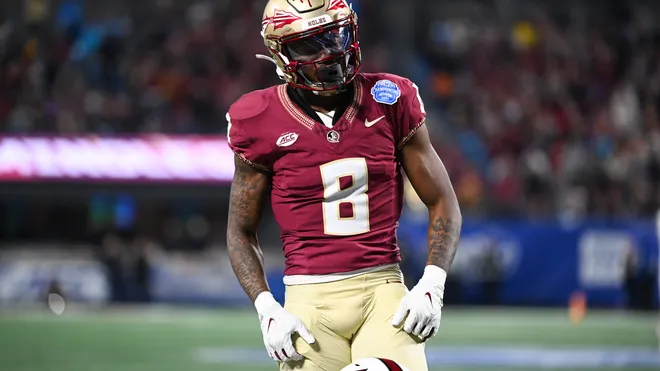Why FSU Fell Short: Four‐Star CB CJ Bronaugh Surprise Flip to UF, Leaving Seminoles Disappointed and Questioning Strategy
FSU’s hopes of landing four-star cornerback CJ Bronaugh suffered a sharp blow this Wednesday when the Florida native surprised recruiting observers by pledging to the University of Florida. The Seminoles’ spirited push, which included official summer visits, high-profile coaching outreach, and showcasing recent defensive backroom additions, ultimately fell short. Their loss is Florida’s gain, and Nebraska’s initial hopes have shifted back into flux. Let’s unpack every angle—from Bronaugh’s impressive credentials to the Seminoles’ recruitment missteps, Florida’s landing strategy, and what this means for the recruiting landscape moving forward.
Bronaugh, a 6′1″, 175‑pound standout from Windermere High in central Florida, is a blue-chip talent. He’s ranked among the nation’s top 100 prospects (No. 72 overall per 247Sports) and is typically within the top 15 cornerbacks in his class. Blessed with elite speed, Bronaugh has consistently clocked sub‑10.40 in the 100m and low‑4.30s in the 40-yard dash—making him one of the fastest recruits in America . He also shined on the football field, recovering from a torn quad to notch six interceptions in just seven games, including three returned for touchdowns.
Those eye-popping athletic numbers—like a 10.33-second 100m and 4.39-second 40-yard dash—generated buzz at camps across the Southeast and put him on the radar of multiple powerhouse football programs.
In November 2024, Bronaugh verbally committed to the Nebraska Cornhuskers, drawn by their recruiting emphasis, coaching relationship, and opportunity to stand out in Lincoln. Nebraska’s secondary coach John Butler, fresh off NFL experience, made a strong impression early on. The staff frequently emphasized Bronaugh’s importance to the program, reinforcing their commitment with personal visits and visits to campus that highlighted Nebraska’s passionate fan base and culture.
But even after the pledge, Bronaugh remained open-minded, scheduling official visits to Florida (May 30), Nebraska (June 6), Florida State (June 13), and Penn State (June 20). Florida State responded in kind, sending their defensive coordinator Tony White and DB coaches Evan Cooper and Pat Surtain Sr. to Winter Garden to maintain contact and deepen Bronaugh’s connection to Tallahassee.
FSU’s pitch leaned on both personal relationships and program momentum: the Seminoles’ revamped defensive staff and Florida pipeline appeal were key selling points. As Bronaugh himself said, FSU had “done a good job recruiting me and always talking to me… they are up there” in his final evaluations.
Despite strong campaigns from Nebraska and FSU, the University of Florida executed a flawless late-stage surge. UF offered Bronaugh later than its rivals but wasted no time—coaches like Deron Wilson made immediate personal outreach, organizing campus visits and showcasing Florida’s unique strengths as a hometown program .
Their strategy paid off. By the time his official visits concluded, Bronaugh chose UF. The Gators leveraged local ties and regional familiarity—Bronaugh is a Florida native—plus demonstrated elite speed alongside Florida’s strong defensive back development credentials . In the end, the opportunity to stay home, play for a high-profile SEC program, and remain close to family likely triumphed over the other considerations.
FSU’s inability to match Nebraska’s early lead and Florida’s regional advantages cost them a coveted 4-star cornerback. Despite strong scouting and staff efforts, they were outpaced by proximity, program trajectory, and UF’s precision strike. Florida’s gain cements their recruiting position as a regional powerhouse, while Nebraska will need to retool with more geographically aligned targets. FSU, meanwhile, must overhaul its approach to in-state recruiting—acting earlier, building deeper relationships, and telling a more compelling story.



